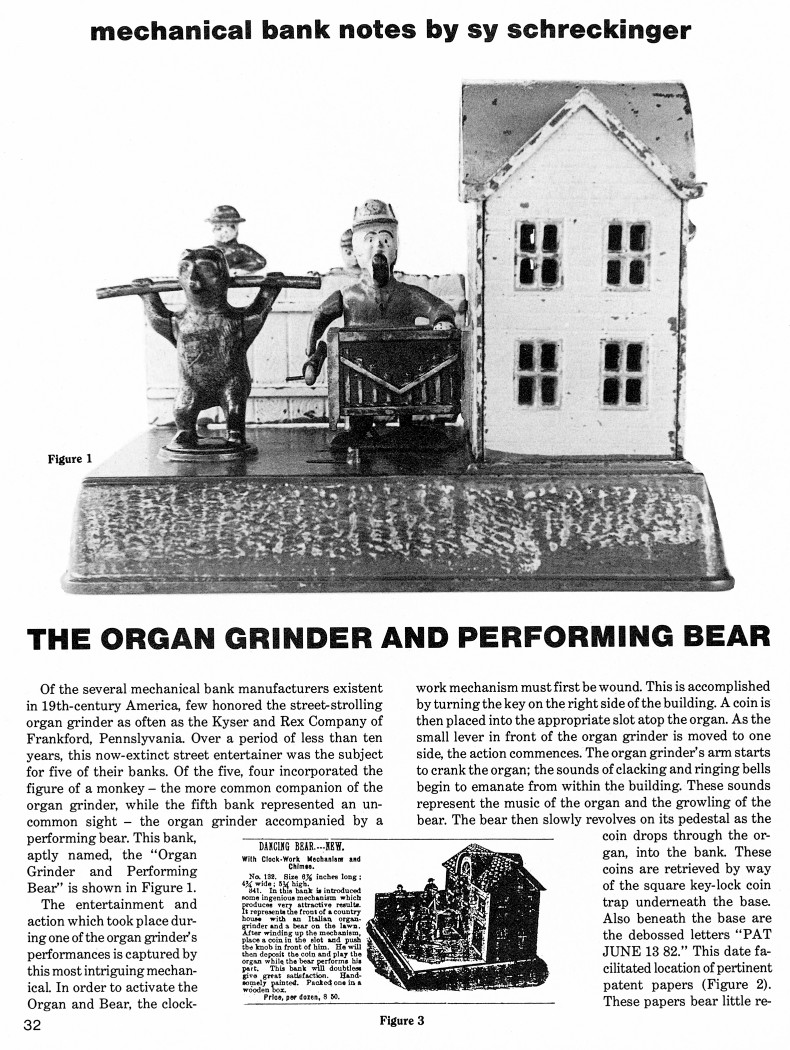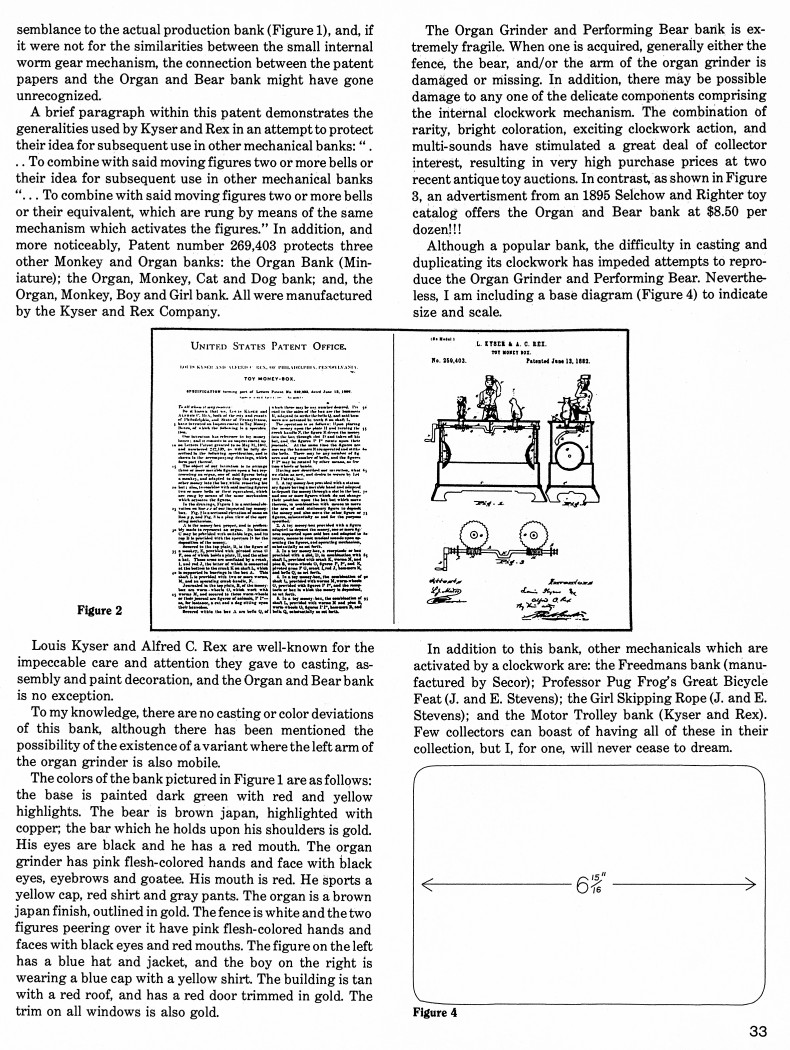|
The Organ Grinder And
Performing Bear
by Sy Schreckinger – ANTIQUE TOY WORLD Magazine – August, 1986
Of the several mechanical bank manufacturers existent in
19th-century America, few honored the street-strolling organ grinder as
often as the Kyser and Rex Company of Frankford, Pennsylvania. Over a
period of less than ten years, this now-extinct street entertainer was the
subject for five of their banks. Of the five, four incorporated the figure
of a monkey – the more common companion of the organ grinder, while the
fifth bank represented an uncommon sight – the organ grinder accompanied
by a performing bear. This bank, aptly named, the "Organ Grinder and
Performing Bear" is shown in Figure 1.
The entertainment and action which took place during one of the organ
grinder's performances is captured by this most intriguing mechanical. In
order to activate the Organ and Bear, the clockwork mechanism must first
be wound. This is accomplished by turning the key on the right side of the
building. A coin is then placed into the appropriate slot atop the organ.
As the small lever in front of the organ grinder is moved to one side, the
action commences. The organ grinder's arm starts to crank the organ; the
sounds of clacking and ringing bells begin to emanate from within the
building. These sounds represent the music of the organ and the growling
of the bear. The bear then slowly revolves on its pedestal as the coin
drops through the organ, into the bank. These coins are retrieved by way
of the square key-lock coin trap underneath the base. Also beneath the
base are the debossed letters "PAT JUNE 13 82." This date facilitated
location of pertinent patent papers (Figure 2). These papers bear little
resemblance to the actual production bank (Figure 1), and, if it were not
for the similarities between the small internal worm gear mechanism, the
connection between the patent papers and the Organ and Bear bank might
have gone unrecognized.
A brief paragraph within this patent demonstrates the generalities
used by Kyser and Rex in an attempt to protect their idea for subsequent
use in other mechanical banks: " . .. To combine with said moving figures
two or more bells or their idea for subsequent use in other mechanical
banks "... To combine with said moving figures two or more bells or their
equivalent, which are rung by means of the same mechanism which activates
the figures." In addition, and more noticeably, Patent number
259,403
protects three other Monkey and Organ banks: the Organ Bank (Miniature);
the Organ, Monkey, Cat and Dog bank; and, the Organ, Monkey, Boy and Girl
bank. All were manufactured by the Kyser and Rex Company.
Louis Kyser and Alfred C. Rex are well-known for the impeccable care
and attention they gave to casting, assembly and paint decoration, and the
Organ and Bear bank is no exception.
To my knowledge, there are no casting or color deviations of this
bank, although there has been mentioned the possibility of the existence
of a variant where the left arm of the organ grinder is also mobile.
The colors of the bank pictured in Figure 1 are as follows: the base
is painted dark green with red and yellow highlights. The bear is brown
japan, highlighted with copper; the bar which he holds upon his shoulders
is gold. His eyes are black and he has a red mouth. The organ grinder has
pink flesh-colored hands and face with black eyes, eyebrows and goatee.
His mouth is red. He sports a yellow cap, red shirt and gray pants. The
organ is a brown japan finish, outlined in gold. The fence is white and
the two figures peering over it have pink flesh-colored hands and faces
with black eyes and red mouths. The figure on the left has a blue hat and
jacket, and the boy on the right is wearing a blue cap with a yellow
shirt. The building is tan with a red roof, and has a red door trimmed in
gold. The trim on all windows is also gold.
The Organ Grinder and Performing Bear bank is extremely fragile. When
one is acquired, generally either the fence, the bear, and/or the arm of
the organ grinder is damaged or missing. In addition, there may be
possible damage to any one of the delicate components comprising the
internal clockwork mechanism. The combination of rarity, bright
coloration, exciting clockwork action, and multi-sounds have stimulated a
great deal of collector interest, resulting in very high purchase prices
at two recent antique toy auctions. In contrast, as shown in Figure 3, an
advertisement from an 1895 Selchow and Righter toy catalog offers the
Organ and Bear bank at $8.50 per dozen!!!
Although a popular bank, the difficulty in casting and duplicating
its clockwork has impeded attempts to reproduce the Organ Grinder and
Performing Bear. Nevertheless, I am including a base diagram (Figure 4) to
indicate size and scale.
In addition to this bank, other mechanicals which are activated by a
clockwork are: the Freedmans bank (manufactured by Secor); Professor Pug
Frog's Great Bicycle Feat (J. and E. Stevens); the Girl Skipping Rope (J.
and E. Stevens); and the Motor Trolley bank (Kyser and Rex). Few
collectors can boast of having all of these in their collection, but I,
for one, will never cease to dream.
|


